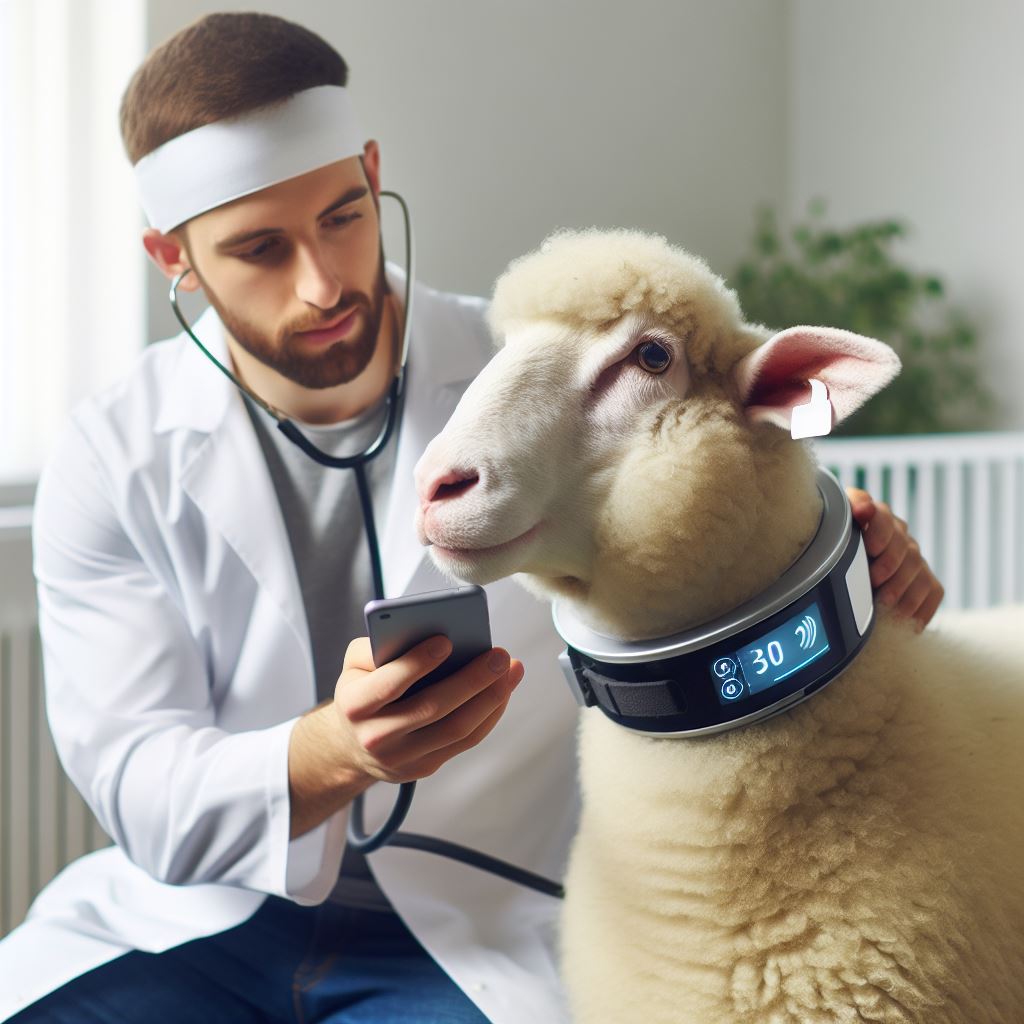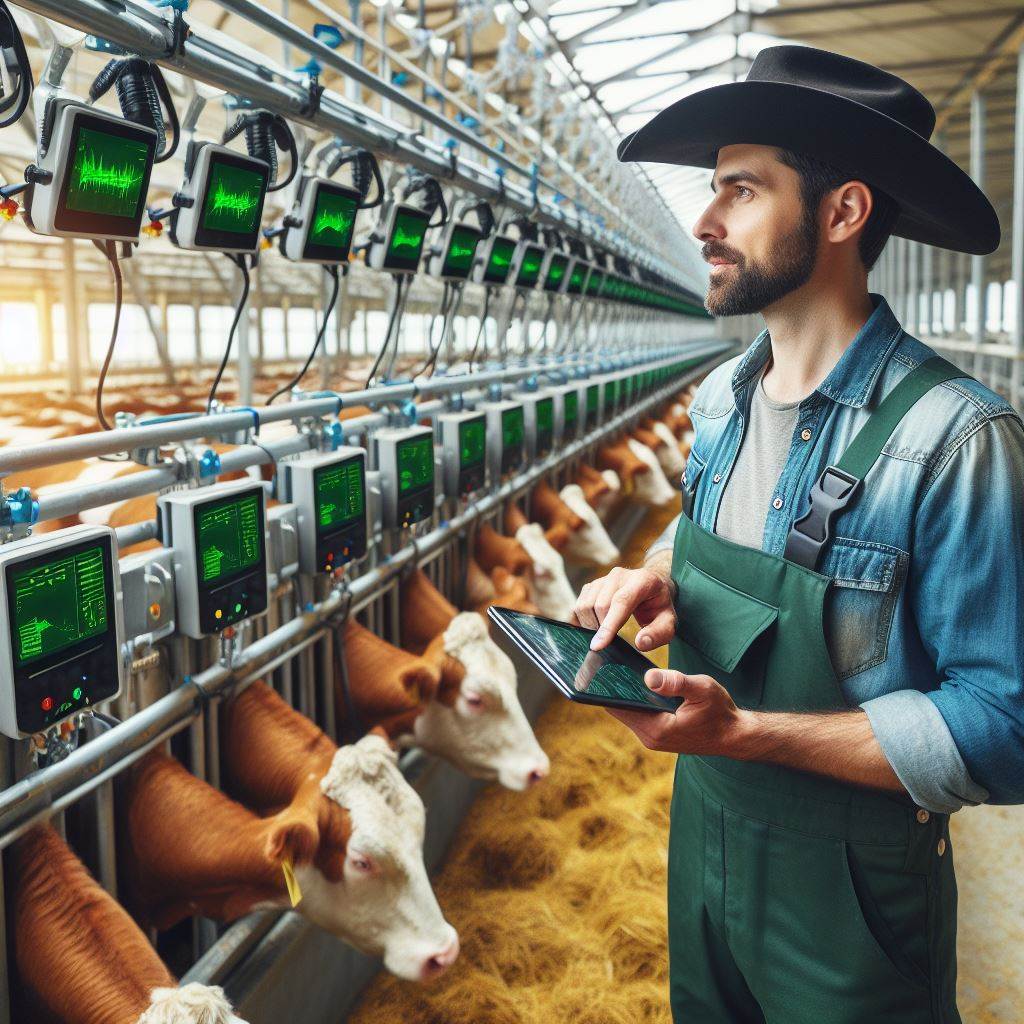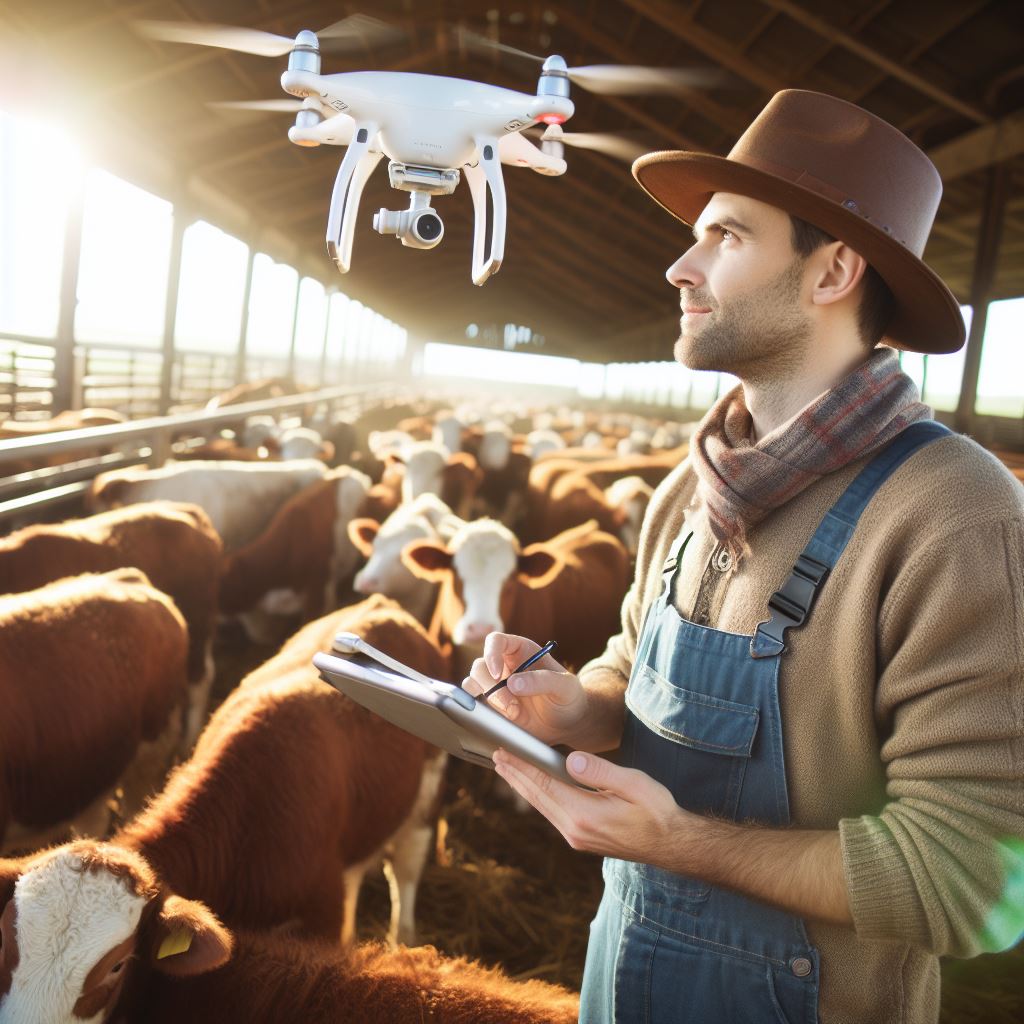Introduction
Definition and Purpose of Smart Collars
Smart collars refer to wearable devices designed to monitor and manage livestock health.
These collars are embedded with sensors and GPS technology to track and collect data about the animal’s well-being, location, and behavior.
Overview of Livestock Health Issues
Livestock health issues such as diseases, injuries, and stressors significantly impact animals’ well-being and agricultural productivity.
Detecting these problems early is crucial for effective treatment and prevention.
Thesis Statement: Smart Collars as a Revolutionary Solution
Smart collars have emerged as a revolutionary solution to livestock health challenges.
By providing real-time monitoring and data analysis, these collars enable early detection of health issues, improve management practices, and enhance overall animal welfare.
Livestock owners can promptly identify changes in an animal’s temperature, heart rate, or activity levels through smart collars.
This data helps detect illness or distress before symptoms become severe, reducing treatment costs and preventing spread to others.
Moreover, smart collars empower farmers and ranchers to monitor the location and movement patterns of their animals.
This information allows them to ensure adequate grazing, prevent theft or straying, and enhance resource management.
Additionally, smart collars provide valuable insights into animal behavior, like feeding patterns and social interactions.
By understanding these behaviors, farmers can make informed decisions to optimize animal comfort and stress reduction.
Basically, smart collars have the potential to revolutionize livestock health management.
This technology enables early detection, preventive care, and improved welfare, leading to sustainable and efficient livestock production.
Importance of Livestock Health
Impact on Agriculture Industry
- Healthy livestock ensures high-quality food supply.
- Disease prevention in livestock reduces crop and livestock yield losses.
- Improved livestock health leads to increased productivity and profitability in the agriculture industry.
- Healthy animals can be bred to produce superior offspring, enhancing agricultural productivity.
- Healthy livestock improves soil quality through natural fertilizer production, benefiting crop growth.
Economic Significance
- The livestock industry contributes significantly to the global economy.
- Livestock products generate substantial revenue through sales and export.
- Investment in livestock health results in higher market value for animals and their by-products.
- Efficient livestock disease management reduces financial losses for farmers and producers.
- Improved livestock health leads to cost savings in terms of veterinary treatments and medication.
Animal Welfare Concerns
- Ensuring livestock health contributes to their overall well-being and quality of life.
- Healthy animals experience reduced pain, suffering, and stress caused by diseases and infections.
- Proper healthcare and monitoring prevent the spread of contagious diseases among livestock.
- Enhanced livestock health fosters a more ethical and responsible approach to animal farming.
- Addressing animal welfare concerns positively impacts consumer perceptions and food choices.
Impact on Agriculture Industry
Livestock health is crucial for various reasons, benefiting both the agriculture industry and society as a whole.
Transform Your Agribusiness
Unlock your farm's potential with expert advice tailored to your needs. Get actionable steps that drive real results.
Get StartedThe impact on the agriculture industry is significant, as healthy livestock ensures a high-quality food supply.
By preventing diseases in animals, farmers can avoid crop and livestock yield losses, leading to increased productivity and profitability.
Furthermore, healthy animals can be bred to produce superior offspring, enhancing agricultural productivity even further.
Economic Significance
The economic significance of livestock health cannot be overlooked.
The livestock industry contributes significantly to the global economy, generating substantial revenue through sales and export of livestock products.
Investing in livestock health ensures higher market value for animals and their by-products, benefiting farmers and producers.
Moreover, efficient disease management reduces financial losses and leads to cost savings in terms of veterinary treatments and medication.
Animal Welfare Concerns
Animal welfare concerns are also an essential aspect of livestock health.
Ensuring the well-being and quality of life of animals is crucial for their welfare.
Healthy animals experience reduced pain, suffering, and stress caused by diseases and infections.
By providing proper healthcare and monitoring, the spread of contagious diseases among livestock can be prevented.
This approach fosters a more ethical and responsible approach to animal farming, positively impacting consumer perceptions and food choices.
Generally, livestock health holds immense importance in various aspects.
From its impact on the agriculture industry to its economic significance and animal welfare concerns, ensuring the well-being of livestock is essential.
By prioritizing livestock health, we can improve agricultural productivity, drive economic growth, and promote ethical and responsible practices in animal farming.
Read: Sustainable Livestock Farming Technologies
Understanding Smart Collars
Definition and Components
A smart collar is a wearable device designed to monitor and track the health and behavior of livestock. It consists of several components:
- Sensors: Smart collars are equipped with various sensors to gather data on vital signs, activity levels, and environmental factors.
- GPS: Many smart collars include GPS technology, allowing farmers to easily locate their animals.
- Communication Module: Smart collars are connected to a communication module that enables real-time data transmission.
- Battery: These collars are equipped with a long-lasting battery to ensure continuous monitoring.
Key Features and Functionality
Smart collars offer a range of features and functionalities to improve livestock health management:
- Health Monitoring: The sensors in smart collars analyze data on heart rate, body temperature, and feeding patterns, providing valuable insights into the animal’s health condition.
- Activity Tracking: Livestock behavior, such as grazing, walking, and resting, can be monitored, helping farmers identify any abnormalities or changes in behavior.
- Alerts and Notifications: Smart collars send notifications to farmers regarding any irregularities in an animal’s vital signs, allowing for early detection of illnesses or health issues.
- Geofencing: With GPS capabilities, smart collars can set virtual boundaries for livestock, providing alerts when animals wander beyond designated areas.
Different Types of Smart Collars
There are various types of smart collars available for different livestock species:
- Cattle Smart Collars: These collars are specifically designed for cattle, equipped with large sensors to collect data on their size and weight, as well as monitor their behavior.
- Sheep Smart Collars: Smart collars for sheep are lightweight and waterproof, gathering data on grazing patterns, rumination, and detecting signs of distress.
- Goat Smart Collars: Goat collars monitor activity levels, sleep patterns, and heart rate, aiding in detecting diseases and promoting proper management of goat farming.
- Pig Smart Collars: These collars track pig behavior, feed consumption, and respiratory rates, assisting farmers in ensuring the health and well-being of their pigs.
Smart collars have revolutionized livestock health management by providing real-time data and insights into the health and behavior of animals.
With their advanced features and functionalities, farmers can proactively monitor and address potential health issues, improving overall livestock welfare and productivity.
Read: Breeding Tech: New Trends in Livestock Genetics
Benefits of Smart Collars in Livestock Health Monitoring
Early Disease Detection
- Smart collars can monitor vital signs and behavior, enabling early detection of health issues.
- The collars can accurately identify abnormal patterns and alert farmers to potential diseases.
- By detecting diseases early, farmers can take timely action to prevent further spread and minimize losses.
Real-time Tracking and Monitoring
- Smart collars provide real-time tracking and monitoring of livestock, allowing farmers to know their exact location.
- This helps prevent theft and illegal activities, ensuring the safety and security of the animals.
- Farmers can also monitor the movement patterns of their livestock, making it easier to locate and manage them.
Improving Overall Animal Welfare
- Smart collars contribute to better animal welfare by ensuring prompt medical attention.
- The continuous monitoring allows farmers to detect signs of distress, discomfort, or injury.
- This leads to better care and treatment, reducing suffering and enhancing the well-being of the livestock.
Enhancing Efficiency in Farm Management
- Smart collars automate data collection, reducing the need for manual record-keeping.
- Farmers can easily access important information about their livestock’s health and activities.
- This streamlines farm management processes, saving time and improving overall operational efficiency.
Economic Impact on Livestock Industry
- Smart collars have a significant economic impact on the livestock industry.
- By preventing the spread of diseases and reducing mortality rates, farmers can save costs.
- Improved animal welfare also leads to increased productivity, higher quality products, and better marketability.
Essentially, smart collars bring numerous benefits to livestock health monitoring.
They enable early disease detection, real-time tracking, and monitoring of animals.
Showcase Your Farming Business
Publish your professional farming services profile on our blog for a one-time fee of $200 and reach a dedicated audience of farmers and agribusiness owners.
Publish Your ProfileSmart collars also contribute to better animal welfare, enhance farm management efficiency, and have a positive economic impact on the livestock industry.
The implementation of smart collars revolutionizes the way farmers care for their livestock, ensuring their health, safety, and overall well-being.
Read: Top 2024 Livestock Health Monitoring Gadgets

Successful Use Cases of Smart Collars
Improved Disease Management
Smart collars have proven to be effective in managing and preventing diseases in livestock.
These collars can monitor vital signs, detect abnormalities, and send timely notifications to farmers.
By providing real-time data on the health of individual animals, farmers can take immediate action to prevent disease outbreaks.
Preventive Measures for Parasite Control
Smart collars are also useful in preventing and controlling parasites in livestock.
They can monitor the activity levels of animals and identify signs of infestation or abnormal behavior patterns.
Farmers can receive alerts when the collars detect increased scratching or restlessness, indicating a potential parasitic infestation.
This early detection allows farmers to administer targeted treatments and prevent the spread of parasites among the herd.
Optimizing Feeding and Nutrition Programs
Smart collars can provide valuable insights into the feeding and nutrition programs of livestock.
By monitoring the eating patterns and activity levels of individual animals, farmers can ensure optimal nutrition.
These collars can track the amount of food consumed by each animal, helping farmers identify any anomalies or deviations.
Comprehensive data analysis from the collars can enable farmers to make informed decisions about feeding strategies and improve overall herd health.
Enhancing Breeding and Reproduction Practices
Smart collars have also revolutionized breeding and reproduction practices in livestock management.
These collars can accurately predict and monitor the estrus cycle in females, facilitating effective breeding programs.
By utilizing data collected by the collars, farmers can optimize breeding timing, improve conception rates, and increase overall breeding success.
Additionally, smart collars can provide insights into the reproductive health of males, allowing farmers to ensure the quality of their breeding stock.
In short, smart collars have proven to be highly beneficial in various aspects of livestock management.
From disease management to parasite control, feeding optimization, and breeding practices, these collars have revolutionized the industry.
Read: Biosecurity in Livestock Farms: Key Practices
Potential Limitations and Challenges
Cost and Affordability Issues
- Implementing smart collars can pose a significant financial burden for livestock farmers.
- The cost of purchasing and maintaining these advanced devices can be prohibitive for small-scale farmers.
- Additional expenses may include the need for specialized software, data storage, and ongoing technical support.
- To overcome affordability challenges, government subsidies or funding initiatives may be necessary to promote adoption.
- Collaborations with technology companies to develop cost-effective solutions can also help alleviate financial barriers.
Technical Limitations and Connectivity Challenges
- Smart collars rely on stable and reliable connectivity, which may be difficult to achieve in rural areas.
- Poor network coverage or limited internet access can hinder data transmission and real-time monitoring capabilities.
- Technical issues such as device malfunctions, battery life, and data accuracy can impact the overall effectiveness of smart collars.
- Continuous research and development are necessary to improve the technological aspects and address connectivity challenges.
- Collaboration between tech companies, telecommunication providers, and farmers is crucial to ensure robust connectivity solutions.
Training Requirements for Farmers
- Using smart collars effectively requires farmers to acquire new skills and knowledge.
- Farmers need to understand how to interpret the data provided by the collars and take appropriate actions.
- Training programs may be necessary to educate farmers on the utilization of smart collars in livestock management.
- The complexity of smart collar systems may pose a significant learning curve for some farmers.
- Close collaboration between agricultural experts and farmers can facilitate knowledge transfer and support training initiatives.
In general, while smart collars offer immense potential in revolutionizing livestock health management, there are notable limitations and challenges that need to be addressed.
Cost and affordability issues can hinder widespread adoption, necessitating subsidies, and cost-effective solutions.
Technical limitations, including connectivity challenges, must be overcome through collaborations and continuous technological advancements.
Additionally, training programs must be implemented to equip farmers with the necessary skills to effectively utilize smart collars, ensuring successful integration into livestock management practices.
By addressing these potential limitations and challenges, smart collars can indeed become a game-changer in improving the health and well-being of livestock while maximizing farming efficiency.
Gain More Insights: Crop Monitoring AI: Precision Farming Tech
Future Implications and Advancements in Smart Collars
Integration with Artificial Intelligence and Machine Learning
Smart collars have the potential to integrate with artificial intelligence and machine learning algorithms to enhance livestock health monitoring.
These technologies can analyze the data collected by smart collars, identify patterns, and provide real-time insights.
AI-powered smart collars can detect early signs of diseases, monitor vital signs, and even predict potential health risks.
This integration can revolutionize livestock management by allowing proactive measures and reducing the need for manual intervention.
Potential Collaboration with Veterinary Professionals
Veterinary professionals can play a crucial role in optimizing the use of smart collars in livestock health monitoring.
Collaborating with veterinarians can help develop specialized algorithms and criteria for health assessment based on their expertise and experience.
Vets can also assist in interpreting the data collected and provide accurate diagnoses and treatment plans for livestock.
This collaboration can ensure that smart collars are aligned with veterinary science, making them a valuable tool in the hands of professionals.
Developing Advanced Analytics for Data Interpretation
As smart collars collect vast amounts of data, developing advanced analytics for data interpretation becomes essential.
With sophisticated algorithms, the collected data can be transformed into actionable insights for livestock management.
Analyzing data patterns and trends can help identify and address potential health issues before they become severe.
Advanced analytics can also enable comparative analysis among different herds or individual animals, facilitating benchmarking and performance improvement.
In essence, smart collars have the potential to revolutionize livestock health monitoring by integrating with artificial intelligence and machine learning algorithms.
Showcase Your Farming Business
Publish your professional farming services profile on our blog for a one-time fee of $200 and reach a dedicated audience of farmers and agribusiness owners.
Publish Your ProfileCollaborating with veterinary professionals can optimize their usage and accuracy.
Developing advanced analytics will ensure that the data collected by smart collars is transformed into actionable insights for improved livestock management.
As technology continues to advance, the future of smart collars in the livestock industry looks promising, offering better health outcomes for animals and enhanced efficiency for farmers.
Conclusion
Recap of Smart Collar Benefits
Smart collars have proven to be a game-changer in the livestock industry, offering numerous benefits to farmers and their animals.
These innovative devices provide real-time monitoring of animal health, enabling early detection of diseases and reducing mortality rates.
Reinforcement of Livestock Health Importance
The use of smart collars emphasizes the significance of livestock health and highlights the need for proactive management.
By continuously monitoring vital signs, behavior patterns, and feeding habits, farmers can take immediate action to prevent the spread of diseases and ensure the overall well-being of their livestock.
Final Thoughts on the Revolutionary Nature of Smart Collars
The introduction of smart collars marks a revolutionary shift in livestock health management.
These advanced technologies allow farmers to embrace a proactive approach, saving time, money, and resources while improving the overall productivity and profitability of their operations.
In a nutshell, smart collars have emerged as powerful tools in revolutionizing livestock health.
Their ability to continuously monitor animal well-being, detect early signs of illnesses, and optimize management practices showcases their immense potential.
By adopting smart collar technology, farmers can ensure the health and welfare of their livestock while increasing efficiency and sustainability in the industry.




